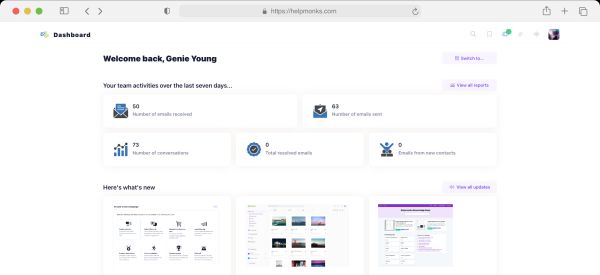
Introducing new pricing for Helpmonks
Discover Helpmonks' new pricing structure, featuring a flexible PRO plan, a FREE plan for smaller teams, and an exciting affiliate program. Experience unparalleled email management solutions today!
Read nowTo find a dependable CRM for marketing, it's crucial to keep up with the latest platforms available. A marketing CRM is an invaluable resource for businesses wanting to increase their visibility and customer engagement. As your customer base grows, building personal relationships with them becomes challenging. With a CRM, you can keep up the high standards of care you had when your customer base was small.
When choosing a CRM for marketing, consider features that automate and streamline your efforts. We have compiled a list of the top 2023 marketing CRM platforms to make your decision easier.
A CRM (customer relationship management) software platform helps businesses manage day-to-day customer interactions. It is designed to help you improve business relationships and ultimately increase sales.
A marketing CRM specifically focuses on the marketing aspects of managing customer relationships and helps you create more effective campaigns. It allows you to track customer data, segment leads, personalize messages, measure ROI, and generate high-quality leads.
One of the biggest benefits of a CRM is it allows you to collect customer information and activity in one go. Most CRMs automatically store this information in a centralized database, eliminating the need for monotonous tasks such as filling spreadsheets.
When shopping for a CRM, you'll encounter these three types: collaborative, operational, and analytical. These CRMs vary in terms of features and focus. Let’s take a closer look at each type.
Collaborative CRMs focus on breaking down silos. It is not uncommon for sales, marketing, and customer support teams to feel disconnected. They often operate from different spaces in the office and sometimes geographically.
Providing a seamless customer experience with such a distributed team requires collaboration. Hence, collaborative CRM comes into play as it provides an integrated platform for all customer-facing teams to connect and communicate in real time.
What does a collaborative CRM do?
An operational CRM is designed mainly to improve marketing, sales, and customer service functions. It streamlines all customer interactions and helps teams handle a customer's journey more efficiently, even when it has many touchpoints.
This software has lots of time-saving automation, including:
Analytical CRMs help you analyze customer data to gain insights to help you make better decisions for your business. It collects large quantities of data on customer behavior patterns, but it doesn't stop at that. This CRM also has features that help you use this raw data to create reports that can be used for marketing decision-making.
Now that you know which types of CRMs are available, here are some essential features you should look for when selecting a CRM.
Tracking and responding to emails through the traditional inbox can be time-consuming. It's easy to miss important emails in the conventional inbox, and responding late can lead to losing potential customers.
Email marketing features in a CRM help to keep teams organized and productive. Go for a CRM that integrates with your calendar so that you can track customer emails and assign tasks to team members. A CRM with automated email templates, such as welcome and follow-up templates, makes it easy for teams to respond quickly and efficiently.
Another essential feature of a CRM is its ability to segment customers according to their behavior, demographic information, or economic status. This helps you target specific customer segments with relevant products/services and the right marketing messages.
Customer segmentation also helps you determine the value of each customer, discern the ideal customer profile, and optimize the customer life cycle.
Targeted campaigns help you give potential and existing customers personalized and relevant content. A CRM should have features that help you create and manage campaigns based on customer insights.
This can include automated campaigns to nurture leads or deliver content and A/B testing to fine-tune your campaigns. For instance, when a new customer clicks a link in your welcome email sequence, you can automatically use the CRM to trigger a series of emails related to their interests.
Collating all customer information in a single system helps you standardize data from various sources. This makes accessing customer information in one place, analyzing customer trends and patterns, and responding quickly to customer inquiries or requests easier. A CRM allows you to store all customer data in one central database, ultimately reducing silos.
A CRM that can collect, analyze and deliver customer data helps you create personalized messages and offers. Such personalized messaging improves user experience and increases sales.
A data-driven CRM can also identify types of content that resonate with customers and inform marketing strategies. As a result, you can send messages tailored to the customers’ needs, interests, purchase habits, or lifestyles.
CRM software can also automate marketing activities such as campaigns, emails, and promotions. This automation makes it easy for teams to save time on mundane tasks and focus their efforts on more important things like creating content or analyzing customer data.
On top of that, automated workflows allow you to send out targeted messages based on customer preferences and engage customers more effectively.
Analyzing campaign performance in real time allows marketers to adjust their strategies on the go. A CRM with built-in analytics capabilities helps you monitor customer behavior, track response rates, and make changes to campaigns accordingly. This, in turn, can help you increase engagement, leads, and sales—all in real time.
A CRM that connects to the software solutions you use daily in the office can be a great time-saver. Connecting your CRM with third-party tools like Slack, MailChimp, or Zendesk allows you to automate marketing tasks and manage customer data across multiple platforms. Ensure you buy a CRM whose integrations are easy to implement.
Some third-party integrations that can make your life easier include:
Providing excellent customer service is one of the best ways to grow your business and gain loyal customers. Most CRM systems today have built-in chatbots that can answer customer queries quickly and efficiently, 24/7.
They also know when to escalate and can help you gather valuable insights, such as customer sentiment, that would otherwise take hours of manual effort.
Other customer support functions to look for in an AI chatbot include the following:
Finally, when selecting a CRM for marketing, it is vital to check whether the platform meets industry standards and complies with global data privacy laws. The best CRMs will have dedicated teams that monitor security procedures constantly and are committed to protecting customer data.
Look for features like end-to-end encryption, two-factor authentication, and role-based access control.
Here are the best marketing CRM systems in 2023 based on features and customer support, price, and ease of use.
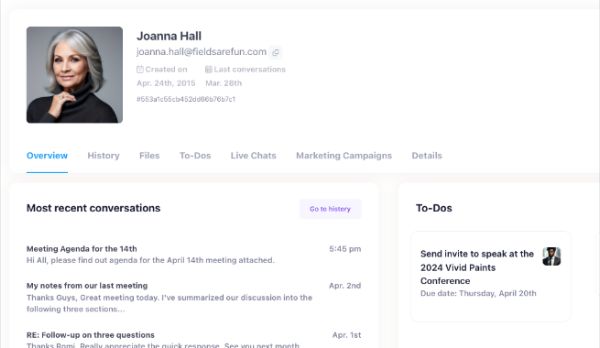
Helpmonks CRM is seamlessly integrated into the email management platform, providing powerful and agile tools to track sales, collaborate efficiently, and leverage email marketing with email automation.
This CRM creates a comprehensive customer platform and captures all important customer details. When you click on a customer's profile, you can see the most recent conversations, making it easy to track where you left off.
The platform also notifies you of the email campaigns you have yet to send to a customer. This makes it easy to be on top of your customer outreach.
Helpmonks top features include:
The CRM also helps ensure you get the best results from your email campaigns. It lets you store all the relevant information you need to close a deal in your email messages. You can even set up reminders for your team members to follow up on leads.
Overall, Helpmonks CRM is an excellent tool for marketing teams who want to get the most out of their email campaigns. It helps keep all customer information organized and makes collaborating with other team members easy.
The platform also allows you to create targeted email marketing campaigns that will help you reach your desired results faster.
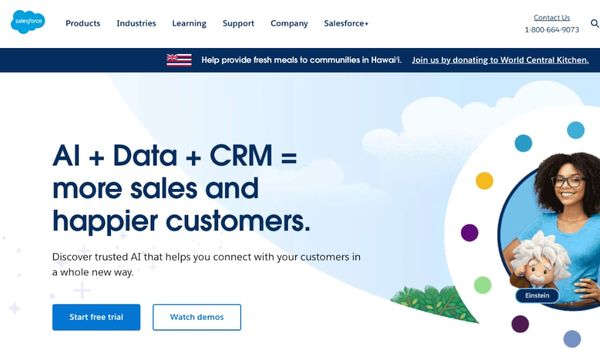
Salesforce is an industry-leading CRM that's suited for both large and scaling businesses. This software has an all-in-one solution that allows teams to manage contacts, leads, and customers to close more sales.
For teams that need a highly customizable solution with multiple integration options, Salesforce is a great choice. Its support team provides hosts of support to help you customize the platform to your needs.
Additionally, this platform integrates with over 1,000 platforms, making it ideal for teams needing a CRM that integrates with other everyday software. However, it takes work to set up.
This platform works best for marketing teams needing a CRM with targeted email marketing capabilities. It allows you to segment customer data to increase engagement, automate your email campaigns, and send ideal content to audiences.
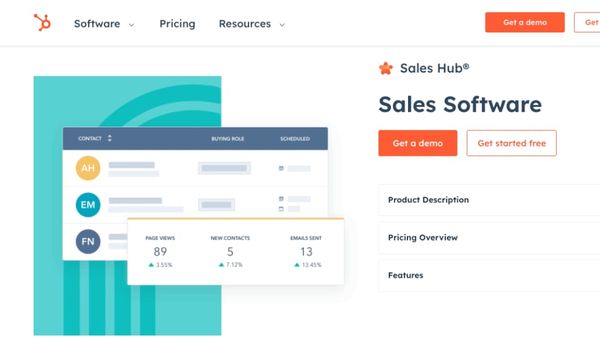
HubSpot CRM is a cloud-based platform ideal for businesses of all sizes looking to track and nurture leads better across different channels. It supports monitoring inbound and outbound leads and helps with contact management.
This CRM has a range of email marketing tools that help you boost open and click-through rates while creating personalized messages for your audiences. It also has powerful A/B testing and analytic features that your team can use to optimize campaigns as they go.
The platform provides real time sales insights so you can measure team performance easily. It offers a range of customization options for teams to tailor the CRM to their needs. Plus, it's easy to set up and doesn't require extra training or resources.
Hubspot CRM database allows you to store up to one million contacts in a centralized place with no expiration date. This makes it ideal for large businesses with large contact databases. Most importantly, it integrates with over 1,000 apps, including Shopify and WordPress.
This CRM is best for teams that need cross-channel lead nurturing. You can create automated lead nurturing workflows to engage and nurture leads more efficiently.
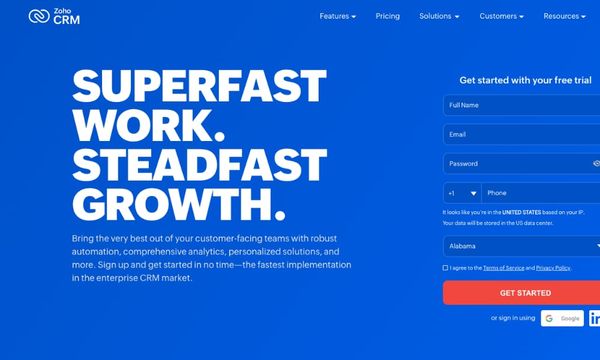
Zoho CRM is ideal for growing businesses as it scales with your needs. It is a feature-rich tool that helps teams manage customer data in one place.
For new businesses unfamiliar with complex CRM software, Zoho is relatively simple to learn. It has an intuitive design that helps your team quickly onboard and start using the tool right away.
Zoho CRM is an excellent choice if you need a single platform for all communication needs with your leads, customers, and prospects. Its omnichannel capabilities allow you to connect your emails, social media, website forms, phone, and live chat. This makes it easy for different departments to work together and provide the best possible customer experience.
Zoho CRM is ideal for teams looking for help with lead management. Its lead management tool has positive and negative scoring, making it simple to identify hot and cold leads. From the moment a lead enters your system, you can track their activity and prioritize as necessary.
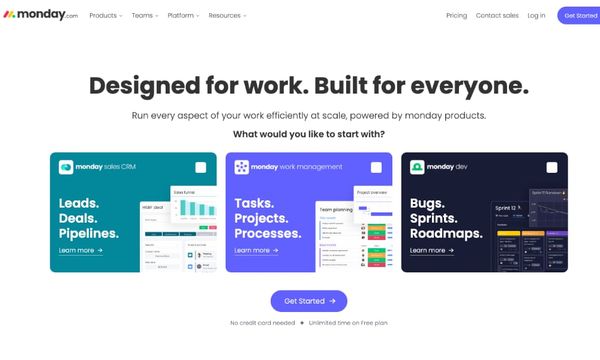
Monday.com is a cloud-based open-source platform that allows teams to collaborate and stay organized. It is a great CRM platform for marketing teams, as it helps them keep track of customer data in an accessible way.
This CRM has a visually appealing and intuitive user interface that's self-explanatory. This makes it ideal for small and medium-sized businesses using a CRM for the first time. In addition, its drag-and-drop user interface makes it highly customizable to various business needs.
One thing that sets Monday.com apart is its customer support features. It offers 24/7 customer support, daily live webinars, a knowledge base, and a conversation panel that makes it easy for team members to get the most from the system.
Aside from that, this platform has great lead-tracking capabilities that allow you to prioritize leads and find the sales opportunities that will be most profitable. This makes it great for teams looking to optimize their marketing budget and maximize ROI.
Monday.com is ideal for businesses needing a comprehensive platform to manage customer data and collaborate with different teams. It has a great budgeting tool that enables business owners to maximize their marketing budget and drive sustainable growth.
A marketing CRM can be a powerful tool for businesses of all sizes. It allows marketers to track customer data and create custom campaigns tailored to each client’s needs. On top of that, it helps you stay organized and optimize your marketing budget to maximize ROI.
When selecting a CRM for marketing, it is crucial to consider your goals and budget. If you're looking for a simple CRM for your emailing needs, try Helpmonks. Our simple emailing feature will help you transform your marketing campaigns and increase sales and customer retention.

Discover Helpmonks' new pricing structure, featuring a flexible PRO plan, a FREE plan for smaller teams, and an exciting affiliate program. Experience unparalleled email management solutions today!
Read now
Dynamic email signatures increase brand visibility, build brand identity, and boost conversions. Learn how to create and update dynamic email signatures.
Read now
Looking for an email marketing automation software? This guide shows what to look for. We'll also review the best tools for your online marketing needs.
Read now
Using customer engagement solutions helps you keep your existing customer base and grow. Here are the top 10 customer engagement solutions for your business.
Read now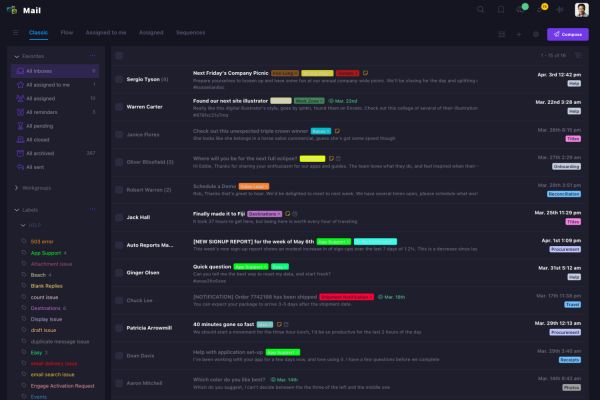
Empower your team and delight your customers.
